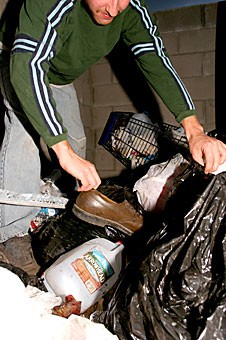In France, they are called gleaners, thousands of individuals worldwide who find food, furniture and clothing in trash bins in alleys.
Here in America, they are known as Dumpster divers, and the practice is more common and closer to campus than most people think.
Every day, a variety of students and locals take to the trash to find their next buried treasure, although the practice is illegal in Tucson.
“”There’s a goldmine in the dumpsters … People throw away the craziest stuff.””
– Brandon David, regional development junior
“”It’s just a health and welfare issue,”” said Sgt. Chris Scholl, a community research officer for the Tucson Police Department. “”There are a lot of diseases and things that can be in a Dumpster, and we try to discourage people from hanging around them because they’re unsafe and unsanitary.””
Despite the health risks, Scholl said that dumpster diving is common within the homeless community.
“”You find a lot of homeless people who go into Dumpsters for a variety of reasons,”” Scholl said. “”Sometimes they are trying to find things that they can salvage and sell Sometimes they’re trying to find food, but oftentimes they are just trying to find a place that’s warm.””
Individuals will often sleep in trash bins, only to wake up the next morning to a garbage truck collecting the bin’s contents. If they are not discovered, the results can be tragic, Scholl said.
“”The potential for danger is always there,”” he said. “”Dumpster diving is just altogether not safe because you have to climb up to get into them, and then you have the potential to fall and get hurt. Plus, most are metal with sharp edges.””
Since the UA is a popular area, Dumpster diving is particularly prevalent here, Scholl said.
“”Around the UA, there are lots of cans, so we get people who are looking to collect the aluminum and sell them for the metal,”” he said. “”We generally don’t arrest people (for it), by and large – we just tell them not to do it again.””
But Dumpster diving is not a practice restricted solely to the homeless. Every day, especially around the end of the year when people are moving from residence halls or houses, students dive head-first into trash bins to find furniture and other things people have thrown away.
“”It’s hippie Christmas,”” said Justin Clark, an environmental hydrology and water resources senior. “”I’ve known lots of people who have found their couches or brand new TVs in trash containers as students move out.””
Each day, the average person creates 4.5 pounds of trash, according to the Environmental Protection Agency, and although Clark doesn’t actively Dumpster dive, he said he doesn’t think the practice should be illegal.
“”The whole controversy is ridiculous,”” Clark said. “”We should encourage people to re-use and recycle instead of arresting or penalizing them.””
Brandon David, a regional development junior, said he used to Dumpster dive as a child.
“”There’s a gold mine in the Dumpsters,”” David said. “”My dad and I used to pull out used VCRs and handcrafted furniture. People throw away the craziest stuff.””
While David understands the law was made in regard to safety, he said he also thinks the positives outweigh the negatives in most cases.
“”If nothing else, it is saving the dump that extra space; it’s preventing waste, and people can benefit from it,”” David said.
Everything can be found online these days, and Dumpster diving is no exception.
According to the Web site www.Dumpsterworld.com, a total of 3,539 members have posted nearly 40,000 tips since it launched in May 2004, sharing their most treasured finds and swapping ideas about the best ways to trade or sell found items.
“”Trash is free game,”” said Taryn Kimmons, a journalism junior. “”One man’s trash really is another man’s treasure.””









